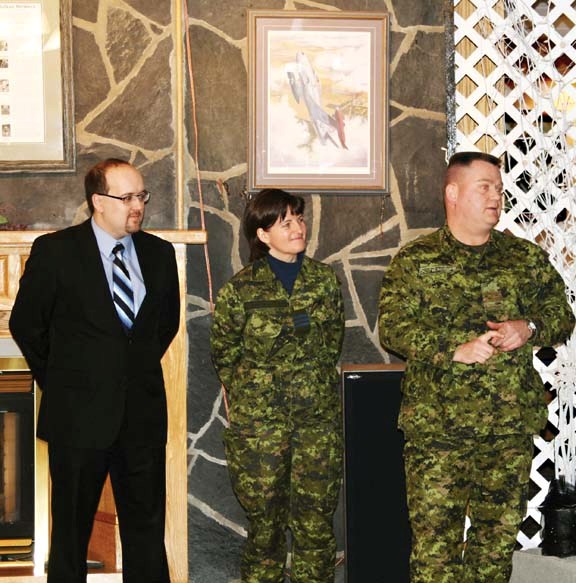4 Wing personnel and their families in the Bonnyville-Cold Lake region can now be treated and receive support here at home, rather than having to travel to Edmonton.
The new Integrated Personnel Support Centre (IPSC) being established at 4 Wing Cold Lake will "improve the quality and care of services received by ill and injured Canadian Forces regular and reserve personnel, retired members,
their families and the families of those who have passed away," according to Brian Stoseth, MP for Westlock-St. Paul
Storseth made the announcement at the 4 Wing Officer's Mess Friday.
The IPSC will operate under the Canadian military's Joint Personnel Support Unit (JPSU), which is headquartered in Ottawa.
Under the mandate of the JPSU, the IPSC will attempt to improve the quality of care and services received by military personnel. It will also attempt to ensure that no member "falls through the cracks," said Storseth.
Prior to the establishment of the new IPSC at 4 Wing, ill or injured military personnel and their families based in Cold Lake had to seek treatment and support in Edmonton.
This created issues that often resulted in personnel not seeking treatment and support, said Storseth.
"This new unit in Cold Lake is going to save a lot of travel time and a lot of frustration, and hopefully increase the uptake of military members, veterans and their families that participate in the programs these JPSUs offer," he said.
The improved quality of care and services provided should better recognize and treat mental health issues, along with physical injuries, explained Storseth.
"Over the course of the past few years our government has focused greater attention and devoted more resources to mental health issues. We have also explored initiatives and partnerships with civilian health care providers, like the Canadian Forces Physical Medicine and Rehabilitation Program," he said
A total of five new IPSCs will be established in communities across Canada, with the 4 Wing centre scheduled to open May of 2012, according to Lt.-Col. Angela Banville.
Storseth explained financial funding for the programs will also receive additional support. Right now "it's about a $35 million program for infrastructure, and about $25 million for operating."
The announcement Friday will add another $7 million towards infrastructure and $4 million to operating costs, he explained.
This money will be spread out between the five new centres, but specific amounts regarding funding allocation to particular centres were not available.
Banville explained the importance of a centre located on 4 Wing. She said 140 personnel based in Cold Lake currently require access to these services, as well as an additional 40 personnel who have accessed these services and are in a period of retention while they transition to civilian life.
"All of these individuals will now be able to get the service and support they require at the centre here, versus travelling to Edmonton," said Banville.
Banville listed some of the services that will be available.
"There will be liaison with veterans affairs personnel, access to financial counselling, vocational rehab access, which will allow them to re-educate or re-train in a new career they move on to."
Major David Blackburn said these programs and the new centre will have a positive regional effect as well.
"We can now also draw on the regional resources we have ... such as a regional adaptive fitness specialist," he said.
Blackburn explained these specialists will work with ill and injured soldiers, using a special fitness program to help current and former military personnel to transition to civilian life.
"That's important because it gives that individual a sense of self and a sense of confidence in their ability to proceed with their future," he said.



